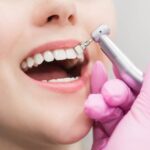Do you ever wake up with sore teeth and jaw joints, or painful neck and head muscles? Does your partner comment on the crunching and squeaking sounds you make when you sleep? Do you notice pain in your teeth or jaw throughout the day, particularly while eating? If you said yes to any of these, it is possible that you are regularly grinding or clenching your teeth. These behaviours, which are collectively known as bruxism, can have various negative effects on your dental health. This is why it’s so important to address pain and discomfort early on. When you refuse to put up with the pain of bruxism, you save yourself a lot of trouble in the future.
Why Do People Grind or Clench Their Teeth?
The act of grinding or clenching your teeth is usually subconscious, and one of the main motivators behind this subconscious behaviour is stress. Many people don’t even realise they’ve formed the habit until significant symptoms start to develop. You may feel that the stressors in your life aren’t big enough to warrant such a reaction — but everyday worries can add up and contribute to ongoing tension. As a result, many of us grind our teeth at night, or regularly clench our teeth during the day.
Anything from starting a new job to facing challenges in your home life can cause more stress than we realise. It can be difficult to both recognise and acknowledge when you’re experiencing tough times. This is particularly true if you’re under strict time constraints or external pressures to continue with the lifestyle you’re pursuing. When we don’t give ourselves the time to stop and destress, the tension in our bodies will manifest in other ways, potentially causing clenched teeth.
Other potential causes of bruxism include alcohol, smoking, caffeine, snoring, recreational drugs, prescription drugs such as antidepressants, and obstructive sleep apnoea. If you are hoping to break this habit, it might be helpful to experiment with cutting down on certain habits and indulgences. Alternatively, if you believe that sleep difficulties might be the cause, these issues should be addressed as soon as possible. Sleeping habits can affect almost every element of our health.
How Does Grinding Your Teeth Affect Your Dental Health?
Teeth grinding and jaw clenching can cause a myriad of issues. Unfortunately, these problems are often the symptoms that first indicate to us that we might have an issue with bruxism. If you have a few of these symptoms, it is best to investigate right away, before other problems arise.
Signs and symptoms of teeth grinding and jaw clenching include:
- Waking up with stiffness in the face and temples
- Ear pain
- Headaches
- Sore jaw or jaw joints, particularly while eating
- Sensitive or aching teeth
- Fractured, chipped or loose teeth
- Cracked or broken fillings
- Tooth mobility
- Temporomandibular disorders (TMD)
Strategies to Help You Minimise the Damage in the Short-Term
To combat the issues associated with bruxism, there are several strategies you can attempt right away. For one, you can try out some breathing exercises, and practice meditation and mindfulness to put your body in a relaxed state. Remember to take care of yourself generally and take time to wind down at the end of your day too.
You could also work on developing a good sleep routine. This will look different for everyone, but essentially you should make efforts to do things that relax you before you go to sleep. Techniques include minimising your screen time at night, swapping caffeine or alcohol with herbal tea, and enjoying a warm bath or shower before bed.
During the day, you should avoid chewing gum and even consuming especially chewy food, as the rhythmic gnashing motion can exasperate your jaw pain. Finally, self-massaging your jaw can work wonders for alleviating pain and relaxing your muscles.
Strategies to Help You Stop Grinding Your Teeth Today
There are a few ways to break the habit of grinding your teeth. The first approach is to pursue stress management. This could involve making changes to your lifestyle, or seeking professional support to improve your mental and emotional well being. The second thing you can do is ask your dentist whether or not you might require a bite guard. These are worn while you sleep to protect your teeth from the effects of grinding.
For some people, the habit of grinding their teeth is one that comes and goes along with external stressors. In cases like these, addressing the stressful elements of their lives will essentially fix the problem, at least temporarily. For other individuals, the process just isn’t that simple. There might be some more serious problems going on with your sleep, or mental health difficulties that will take a much longer period of time to address. If you suspect that this might be your situation, it is best to seek the advice of both your doctor and your dentist. As medical professionals, they can direct you towards the specific care you require.
Don’t Let Grinding or Clenching Become Another Stressor in Your Life
Now’s the time to take action! Try the strategies above and get in touch with professionals, like a therapist or dentist, to help you manage your teeth grinding and clenching before it becomes worse.














